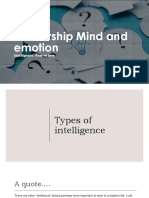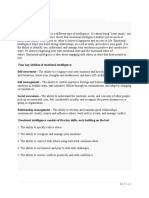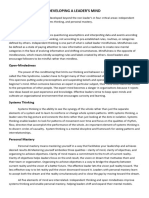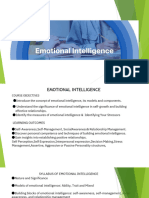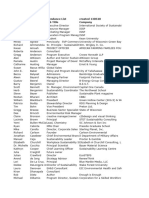Discussion Assignment-5211-4
Discussion Assignment-5211-4
Uploaded by
Kuriakose AkCopyright:
Available Formats
Discussion Assignment-5211-4
Discussion Assignment-5211-4
Uploaded by
Kuriakose AkCopyright
Available Formats
Share this document
Did you find this document useful?
Is this content inappropriate?
Copyright:
Available Formats
Discussion Assignment-5211-4
Discussion Assignment-5211-4
Uploaded by
Kuriakose AkCopyright:
Available Formats
Emotional intelligence is a necessary characteristic for someone who wants to perform well and
achieve their objectives. Emotional intelligence is described as the ability to regulate one's emotions,
to be aware of one's reactions to various circumstances, and to understand how emotions influence
outcomes. This is crucial in terms of self-efficacy since it decides how one interacts with others.
Before communicating with others, emotional intelligence allows you to understand their
psychological states and moods. With this knowledge, one can approach people with kindness and
develop empowering relationships. Self-efficacy is influenced by such relationships. A keen
knowledge of one's feelings often provides insight into whether one is making good or bad decisions.
Emotional intelligence requires emotional control, which ensures that emotions cannot take
precedence over important matters. This leads to a high level of self-efficacy.
Emotions in the workplace have an effect on the working environment. A leader who is emotionally
intelligent can read emotional moments and, more importantly, the emotions of his or her team.
Creating an emotionally favourable atmosphere in this way fosters optimism. In contrast to a
conflict-ridden world, emotional intelligence resolves situations, enabling people to reflect on the
positive aspects of their lives and how they can improve.
Mindfulness refers to being conscious of one's own needs, preferences, and how changes can affect
them. Since it determines how tasks are distributed, this encourages an emphasis on success. The
division of responsibilities is driven by mindfulness, with goal-achievement and success taking
precedence.
A mindless leader will learn by gradually analysing people's feelings and communicating with their
team to gain a better understanding of their viewpoints. A mindless leader may become a mindful
leader by promoting observation and methods that portray mindfulness. This improves a leader's
success because they can connect to their team, understand their needs, and strive to inspire them
by delivering the best possible working environment.
References
Login... Assignment Help. (n.d.). http://www.expertsmind.com/library/mindfulness-and-
mindlessness-techniques-impact-self-efficacy-52192127.aspx.
How Mindfulness Can Grow Emotional Intelligence. PositivePsychology.com. (2020,
September 1). https://positivepsychology.com/mindfulness-emotional-intelligence/.
Mindfulness and Self-Efficacy. Open Textbooks for Hong Kong. (2015, October 2).
http://www.opentextbooks.org.hk/ditatopic/28265.
You might also like
- Compact Dry: in Water AnalysisDocument3 pagesCompact Dry: in Water AnalysisMazin AL-RahbiNo ratings yet
- Importance of Emotional Intelligence at Work PlaceDocument5 pagesImportance of Emotional Intelligence at Work PlaceDevank Gupta100% (1)
- Unit 3Document15 pagesUnit 3Udaya sankari sankariNo ratings yet
- Emtional Intelligence DeminsionDocument6 pagesEmtional Intelligence DeminsionRafiya ChaudryNo ratings yet
- VCL-7-Leadership Mind and EmotionDocument34 pagesVCL-7-Leadership Mind and EmotionS Varun SubramanyamNo ratings yet
- Article: Emotions and Leadership-The Role of Emotional IntelligenceDocument4 pagesArticle: Emotions and Leadership-The Role of Emotional Intelligencems170200154 Jan AlamNo ratings yet
- The Power of Emotional IntelligenceDocument3 pagesThe Power of Emotional IntelligenceceliadessardNo ratings yet
- Emotional Intelligence EQDocument16 pagesEmotional Intelligence EQchaitali.chatterjee12345No ratings yet
- This Is How You BehaveeDocument2 pagesThis Is How You BehaveeoONo ratings yet
- Bài Giảng Dạng Văn Bản (Script)Document8 pagesBài Giảng Dạng Văn Bản (Script)Huỳnh AnhNo ratings yet
- Emotional Intelligence: How to Improve Your IQ, Achieve Self-Awareness and Control Your EmotionsFrom EverandEmotional Intelligence: How to Improve Your IQ, Achieve Self-Awareness and Control Your EmotionsNo ratings yet
- Developing Emotional IntelligenceDocument9 pagesDeveloping Emotional IntelligenceAnurag SharmaNo ratings yet
- Business StudiesDocument17 pagesBusiness StudiesMerina GhoghwaniNo ratings yet
- Emotional IntelligenceDocument14 pagesEmotional IntelligenceComagal Rajagopal100% (2)
- LESSON 8 PERDEV - Personality DevelopmentDocument3 pagesLESSON 8 PERDEV - Personality DevelopmentAngela MagtibayNo ratings yet
- Intelligence AssignmentDocument5 pagesIntelligence AssignmentWriters expertNo ratings yet
- Article - The Importance of Emotional Intelligence in LeadershipDocument6 pagesArticle - The Importance of Emotional Intelligence in LeadershipTamrat EstifanosNo ratings yet
- Management Project About Emotional Intelligence.Document10 pagesManagement Project About Emotional Intelligence.Ayoto KunNo ratings yet
- Increase Your EQ Increase Y - (Z-Library)Document105 pagesIncrease Your EQ Increase Y - (Z-Library)Pyro NinjerNo ratings yet
- EQDocument6 pagesEQSarah Ahmad100% (1)
- Organ. BehaiDocument5 pagesOrgan. BehaiEzenwafor EvansNo ratings yet
- SJ Emotional IntelligenceDocument28 pagesSJ Emotional IntelligencedrragravatNo ratings yet
- Navigating The Workplace With EIDocument8 pagesNavigating The Workplace With EIdbsVNo ratings yet
- EMOTIONAL INTELLIGENCE 101 : The complete guide to controlling your emotionsFrom EverandEMOTIONAL INTELLIGENCE 101 : The complete guide to controlling your emotionsNo ratings yet
- 12 Competencias de La IEDocument6 pages12 Competencias de La IEaldo zavalaNo ratings yet
- Emotional Intelligence: Presented By: MAHAM FATIMA 16-NTU-0075Document12 pagesEmotional Intelligence: Presented By: MAHAM FATIMA 16-NTU-0075Maham SaifNo ratings yet
- Emotional IntelligenceDocument5 pagesEmotional IntelligenceYugal KafleNo ratings yet
- Emotional intelligenceDocument6 pagesEmotional intelligencessimmply862No ratings yet
- Emotional IntelligenceDocument20 pagesEmotional Intelligenceliliana100% (1)
- Developing A LeaderDocument3 pagesDeveloping A Leaderheinhtetsan425No ratings yet
- Emotional IntelligenceDocument22 pagesEmotional Intelligencekeshav_26No ratings yet
- What Is Emotional IntelligenceDocument10 pagesWhat Is Emotional IntelligenceSRSNo ratings yet
- Emotional IntelligenceDocument4 pagesEmotional IntelligenceAbbie RamosNo ratings yet
- Emotional Intelligence To Empower Women: Master Your Emotions, Build Your Strength, Change Your LifeFrom EverandEmotional Intelligence To Empower Women: Master Your Emotions, Build Your Strength, Change Your LifeNo ratings yet
- Self-Awareness and Issue of Emotional IntelligenceDocument15 pagesSelf-Awareness and Issue of Emotional IntelligenceMUDIT SHARMANo ratings yet
- Emotional IntelligenceDocument13 pagesEmotional Intelligenceapi-237068882100% (2)
- JceicomDocument1 pageJceicomJade CezarNo ratings yet
- Emotional IntelligenceDocument4 pagesEmotional IntelligenceSteve MwenyeNo ratings yet
- Self-Management, Self-Regulation, and EQDocument8 pagesSelf-Management, Self-Regulation, and EQRabey JamilNo ratings yet
- Emotional Dimension To LeadershipDocument14 pagesEmotional Dimension To LeadershipRossalwa Mohd IsaNo ratings yet
- Emotional IntelligenceDocument4 pagesEmotional IntelligenceChristian A. MendozaNo ratings yet
- MSSW Sem 1 Emotional Intelligence PGDocument39 pagesMSSW Sem 1 Emotional Intelligence PGRAJVEER KALSI 20MIS1161No ratings yet
- Mukesh AssignmentDocument1 pageMukesh AssignmentYugal KafleNo ratings yet
- Eq Syllabus PDFDocument14 pagesEq Syllabus PDFsivakumarNo ratings yet
- Discuss The Signifances of Self-Awareness, and Self-Understanding Skills With Examples. Self-Awareness and Self - Understanding SkillsDocument10 pagesDiscuss The Signifances of Self-Awareness, and Self-Understanding Skills With Examples. Self-Awareness and Self - Understanding SkillsGOD'S GRACE STATIONERYNo ratings yet
- UNIT 1 Emotional IntelligenceDocument12 pagesUNIT 1 Emotional IntelligenceAnisha KamatNo ratings yet
- Emotional IntelligenceDocument10 pagesEmotional Intelligencechoprashona3No ratings yet
- Mastering Emotional Intelligence: Building Stronger Personal and Professional RelationshipsFrom EverandMastering Emotional Intelligence: Building Stronger Personal and Professional RelationshipsNo ratings yet
- Essay Emotional IntelligenceDocument2 pagesEssay Emotional IntelligenceDebreuxNo ratings yet
- Emotional Intelligence - 2024Document63 pagesEmotional Intelligence - 2024Hamie BendyNo ratings yet
- Emotional Intelligence - AMMDocument9 pagesEmotional Intelligence - AMMsimon.boatengNo ratings yet
- Prapti Bhume - 75302300150 - ADocument4 pagesPrapti Bhume - 75302300150 - ASugar Plum DiysNo ratings yet
- STS ReportDocument10 pagesSTS ReportKay AbawagNo ratings yet
- Adobe Scan 27 Apr 2024Document10 pagesAdobe Scan 27 Apr 2024heykoushalNo ratings yet
- ISSP 2013 Conference Attendees - 0520Document10 pagesISSP 2013 Conference Attendees - 0520nirbandubaiNo ratings yet
- Indian Antarctic ProgrammeDocument9 pagesIndian Antarctic ProgrammeRita TripathiNo ratings yet
- IFAW Ocean Noise ReportDocument9 pagesIFAW Ocean Noise ReportTejas GangavaramNo ratings yet
- Eastern Quezon College, Inc: Activity TitleDocument3 pagesEastern Quezon College, Inc: Activity TitleKristine G. BatanesNo ratings yet
- Pre Master Plan Solar Energy Production in Palestine: December 2016Document50 pagesPre Master Plan Solar Energy Production in Palestine: December 2016anmn123No ratings yet
- Jurnal Ilmiah Perikanan Dan KelautanDocument13 pagesJurnal Ilmiah Perikanan Dan KelautanErsa Berliana ZanubaNo ratings yet
- Passive Solar Green HouseDocument16 pagesPassive Solar Green HouseAbcd 1234No ratings yet
- Method Statement T&C For Garbage Chute SystemDocument38 pagesMethod Statement T&C For Garbage Chute SystemJeffry M.No ratings yet
- Analisis Kinerja Pengering Surya Photovoltaic Thermal (PV/T) Pada Kondisi Tanpa BebanDocument10 pagesAnalisis Kinerja Pengering Surya Photovoltaic Thermal (PV/T) Pada Kondisi Tanpa BebanAbdul Hadi Al MuttaqinNo ratings yet
- Addis Ababa Science and Technology University College of Biological and Chemical Engineering Department of Environmental EngineeringDocument17 pagesAddis Ababa Science and Technology University College of Biological and Chemical Engineering Department of Environmental EngineeringNatnael workuNo ratings yet
- Worker Accommodation Camp Guidelines R0Document12 pagesWorker Accommodation Camp Guidelines R0saravanan .b100% (1)
- Guide Questions On Industry and Environmental AnalysisDocument1 pageGuide Questions On Industry and Environmental AnalysisJeshel Anne RonquilloNo ratings yet
- Geography Lesson-1 NotesDocument3 pagesGeography Lesson-1 NotesKasi Lakshman SiddinaNo ratings yet
- Study Guide 1 CRPR 2Document16 pagesStudy Guide 1 CRPR 2PETER PAUL ESTILLERNo ratings yet
- A Review of Biomarkers Used For Assessing Human Exposure To Metals From E-WasteDocument24 pagesA Review of Biomarkers Used For Assessing Human Exposure To Metals From E-WastebaridinoNo ratings yet
- Exel (1.1B, 1.4B, 1.4S) : Safety Data SheetDocument27 pagesExel (1.1B, 1.4B, 1.4S) : Safety Data SheetAmgalanbaatarJargalsaikhanNo ratings yet
- FG 100Document13 pagesFG 100Kumara SwamyNo ratings yet
- Philosophy: Whole Brain Learning System Outcome-Based EducationDocument23 pagesPhilosophy: Whole Brain Learning System Outcome-Based EducationMichelJoy De GuzmanNo ratings yet
- Impact of Hydro Power Project by MOOl RAJDocument13 pagesImpact of Hydro Power Project by MOOl RAJMool Raj VermaNo ratings yet
- Patel-DivyaWeek 7 Assignment FinalDocument5 pagesPatel-DivyaWeek 7 Assignment FinalDivya PatelNo ratings yet
- Deforestation: Object 1 Object 2 Object 3 Object 4 Object 5 Object 6Document7 pagesDeforestation: Object 1 Object 2 Object 3 Object 4 Object 5 Object 6ANITTA SNo ratings yet
- Tutor: Angela Ines Paez GROUP: 900003 - 308: Assignment 1. Recognition Forum-Unit 1Document5 pagesTutor: Angela Ines Paez GROUP: 900003 - 308: Assignment 1. Recognition Forum-Unit 1Myriam AgudeloNo ratings yet
- (Do chủ tịch HĐ chấm thi ghi) : Thời gian: 135 phút (Không kể thời gian giao đề)Document6 pages(Do chủ tịch HĐ chấm thi ghi) : Thời gian: 135 phút (Không kể thời gian giao đề)ngoctien010499No ratings yet
- ProformaDocument13 pagesProformaMiko AbiNo ratings yet
- Waste RPDocument15 pagesWaste RP21CS054 HARINI MNo ratings yet
- Water Resources ICSE Class 10Document15 pagesWater Resources ICSE Class 10shreyammandal001No ratings yet
- Criminology 6 finals-WPS OfficeDocument3 pagesCriminology 6 finals-WPS OfficeMaller Chop's Pong-etNo ratings yet





